A Sermon Preached on Martin Luther King weekend at Laurel Presbyterian Church
"When Jesus Makes Us Uncomfortable" from John 2:13-25
I can remember the first-time church going to church troubled me. It was the Sunday before Thanksgiving, 2002. I was set to graduate college in a few short weeks. I was open to visiting a new church with a friend. So, on that morning I drove to the church, I came in, found a pew and sat down moments before the service started. I began turning the pages of the bulletin to see what was happening the service. Then I got to the back cover. I read about the upcoming activities and my eyes glanced to the staff contact section.
And what did I see? Something that felt so appalling, so outrageous, so against my belief system that my arms crossed and my mouth dropped open in utter disbelief.
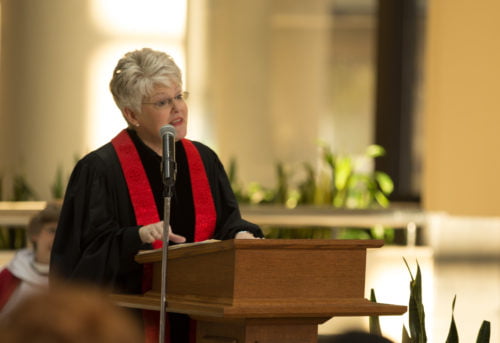 A woman’s name- Sarah was listed as the Senior Minister.
A woman’s name- Sarah was listed as the Senior Minister.
What!?!
I mumbled under my breath toward my friend in the pews: “I’m not learning anything from this woman today.”
You should laugh with me at the irony of this moment now, but you need to understand that at the time, I’d never seen a woman lead a congregation. And it was a really big deal . . .
For I’d grown up in “women can’t even be ushers, that job was left to the men,” Southern Baptist congregation in Tennessee.
In my church if women wanted to be leaders, they had only a couple of options. They could teach other women or the children or marry pastors. Maybe they could lead the mission committee but not much more.
So, with all this true about my experience, you can just imagine the discomfort that exuded from every part of my body that day . . . the twitching, the rocking back and forth in the pews, the despairing looks that I came in the direction of my friend who brought me to this place! What was she thinking and the service hadn’t even started yet!
But somehow I stayed put and listened to Pastor Sarah’s wonderful sermon. A miracle!
In retrospect, I’m SO glad that church made me uncomfortable that day. It was the beginning of a beautiful new journey.
And likewise, in the John 2:13-25, we read a story that for generations has made readers uncomfortable too.
For it presents us with a view of Jesus that is not the warm and fuzzy. Jesus isn’t comforting some who’s lost a loved one. Or healing the sick. Or even holding children.
Nope, we find Jesus at the temple before Passover begins, making a whip out of cords, driving out the animals, pouring the coins out of the money changers bags and overturning their tables. He’s causing a major scene, challenging everything that was normal about how worship happened in his time.
And we find ourselves uncomfortable because it’s not the kind of behavior we teach to our children.
Jesus isn’t following any of the “you are in public” or “politically correct” rules. And shouldn’t he at least try . . .
But Jesus doesn’t.
And maybe just maybe that was exactly the point.
Here’s what we need to understand: this same story also appears in Matthew, Mark and Luke, but in each of these gospels we find it placed in the context of Jesus’ last week. And it’s an event portrayed as a catalyst leading to Jesus’ death.
Yet, in John’s telling of the Jesus story here we are in chapter 2 reading it already. And commentators help us understand that this is for a very particular reason.
For, John’s gospel is all about making a case for Jesus as the Word made flesh. Jesus is God. And most of all, Jesus is an authority to be taken seriously.
And not just an authority but the authority.
When I was growing up in that church in Tennessee that one where women couldn’t even serve as ushers, this passage was often brought up as an example of why I couldn’t sell wrapping paper for my school drive or Girl Scout cookies after church on Sundays. As much as I wanted to hit up all the church folks we knew, it was often quoted to me by someone Jesus' words in verse 16 of this passage:
“Take these things out of here! Stop making my Father’s house a marketplace!”
But looking back on it now, I think this common interpretation and the debate in some churches about whether kids or adults can sell things to their church friends misses the point. In fact, I don’t think Jesus was upset, in John’s gospel about the buying and selling of sacrificial animals so that worshippers could fulfill the law. Nope.
He was upset about the hearts of the people. God was in their midst and they didn’t see!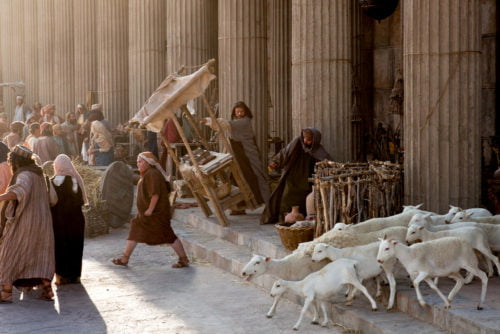
Commentator Karoline Lewis makes it plain: Jesus “calls for a complete dismantling of the entire system.”
Worship was in fact, being done all wrong because they’d lost sight of who they were worshipping.
Such was a lot to claim, you know and to be serious about.
And Jesus even takes the conversation one step further when the crowd asked him for a sign (which is another way of saying prove yourself, Jesus).
Jesus replies: “Destroy this temple and in three days I will raise it up.”
It was a metaphor of course, a way to talk about the fact that one he, Jesus, God in the flesh would be killed on a cross. But on the third day would rise again. The living temple of God with Us in his body would not be held down by human actions.
The crowd gathered around Jesus replied saying “This temple has been under construction for 46 years, and will you raise it up in 3 days?”
Folks didn’t get it. And the discomfort level rose because:
No one had seen a teacher make such claims to be the Son of the Father before.
No one had seen a teacher make such bold declarations about the temple before.
No one had dared to question the human institution where God’s people gathered to worship.
But it was the embodiment of WHO Jesus WAS. And the work he came to do. To show us a new way to live even if it made us all uncomfortable.
So, this morning, I tell you with 100% clarity: the way of Jesus is the way of discomfort.
For the picture of Jesus, we get in texts like this repeatedly is always a vision of man who shows us a new way to live that challenges us, pushes our buttons. It’s a vision of leaving behind the way that things have always been done. It’s a vision of taking up our cross and following, though the way may be difficult.
In the days since Jesus left the earth, even though we have the Holy Spirit as our guide we can easily get off track. When we do, God often sends us prophets to re-direct our course.
One of those prophets in modern times in America is Rev. Dr. Martin Luther King, Jr.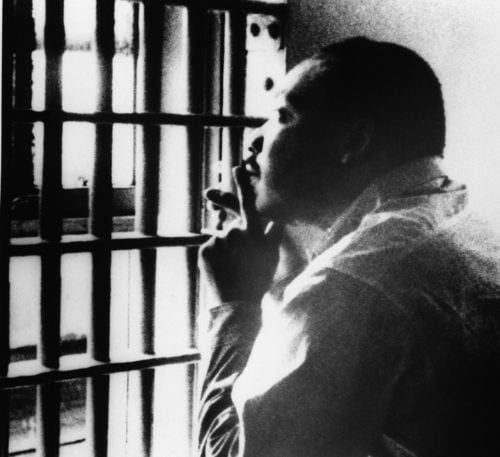
Dr. King was a man who did not set out to be great, to be someone who was remembered with parks and streets and parades named after him. He was just a simple preacher. A married man with children. A trained theologian.
But a man who said yes when the Montgomery Bus Boycott needed a leader, needed someone to speak at its nightly meetings to inspire the protesters to remain strong.
And more and more opportunities came to lead and to serve and to stand up to institutionalized racism through non-violent protests, he listened and went to work.
As Dr. King preached, he pushed the church to be the church.
He pushed the church to live out the Great Commandment to love the Lord your God and to love your neighbor as yourself—meaning all of the neighbors not just the white ones.
He didn’t take no for an answer when it came to injustice in school systems, transportation systems, voting systems, or any systems really. He made a lot of people uncomfortable with the way he talked about Jesus. Especially the white church.
And Dr. King found himself in jail more times than he could have ever imagined.
On one such occasion, a night in Birmingham, AL we know he wrote a letter from prison. In this letter on April 16, 1963, he specifically addressed white clergy—fellow preachers claiming to be bearers of the good news, saying the good news they preached was only for people who looked like them. Dr. King told them it time was now to act, no more excuses.
He spoke the truth with these words: “Injustice anywhere is a threat to justice everywhere. We are caught in an inescapable network of mutuality, tied in a single garment of destiny. Whatever affects one directly, affects all indirectly.”
Though this popular quote is all over the internet this weekend, and its words are so easy to repeat and make us feel good as we say them, I believe the heart of Dr. King’s message was this: a call to action.
And it wasn’t just for Dr. King’s lifetime. It’s our Jesus calling too.
Is there injustice in this world, church? If the answer is yes, then we’ve got work to do.
For my wellbeing is tied to your wellbeing. And your wellbeing is tied to mine.
The authority of Jesus, just as it was presented that day at the temple, leads us on to wake up the sleeping, lift up the silent, champion the forgotten.
The authority of Jesus leads us to speak truth to the powerful, not valuing one person over another because of the position they hold.
The authority of Jesus leads us to call our racism. Call our sexism. Call our homophobia. And discrimination of any kind the basis of creed, religion or ability.
The authority of Jesus asks us stir up discomfort.
Why? Because it is the GOOD NEWS for all of us!
So, are we going to get to work church—not just this weekend, but in all the days ahead? May prayer for all of us is that will be bearers of this good news, relinquishing comfort and allow Christ to be our teacher as we go.
AMEN
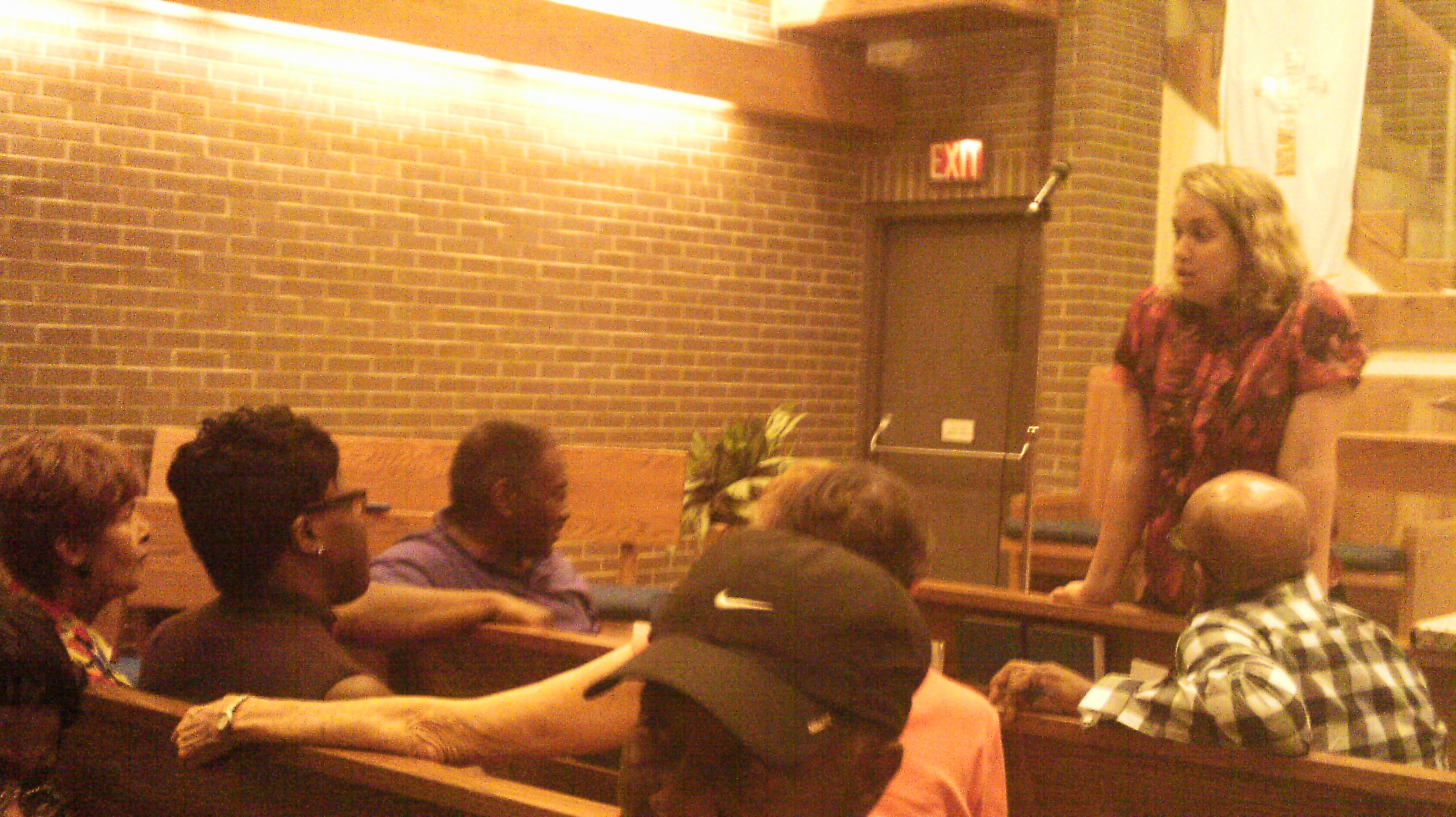 Last Wednesday night, Washington Plaza began a joint fall effort with our friends at Martin Luther King, Jr. Christian Church just down the street in Reston. We're doing Bible Study together for the next 12 weeks.
Last Wednesday night, Washington Plaza began a joint fall effort with our friends at Martin Luther King, Jr. Christian Church just down the street in Reston. We're doing Bible Study together for the next 12 weeks.
MLK Church and WPBC are no strangers to one another. We've been friends for a while now. I count Rev. Jean Robinson-Casey one of my dearest clergy colleagues. Over the course of the past two years, we've shared a special Diversity service together, Good Friday services, a Maundy Thursday service and one Sunday morning joint worship service where I was asked to preach for MLK's 30th anniversary (with a joint lunch together to follow).
But as is the case with all kinds of friendships, there comes a time when you have to take things to the next level. If you are going to be friends, you really have to be friends, not just in words but in actions. Rev. Casey and I both agreed that a joint Bible study on Wednesday nights this fall was just the right next step. Our fellowship and learning would be sweeter, we knew. Rev. Casey and I dreamed together one afternoon over lunch about what we might like to study and how our coming together could bless both of our congregations. We'd study, Barbara Brown Taylor's book, An Altar in the World. And, let the Spirit lead us into the rest.
Last Wednesday night, we had a great kick-off to this joint venture! The sweetness that always seems to be there when both churches gather shone through. It seems no profound to say it was fun, but it truly was! We laughed and shared stories with one another. It felt to me, as it always seems to feel when we gather that "This is how church should be!" MLK folks came over to WPBC's sanctuary and I led the discussion. Tonight, we'll go to MLK's building and Rev. Casey will lead us.
The sky's the limit to see how God continues to lead our friendship as we grow together in study this fall! I'm one happy pastor to be along for the ride.
Promise in Night: Endurance to Stand
Mark 15:1-20 with Isaiah 50:4-9
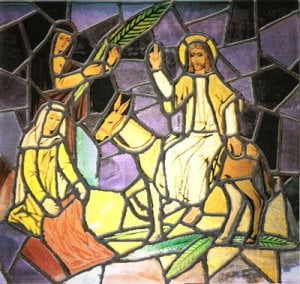 As we began our service today outside, we re-enacted together what it might have felt like to be among the crowd waving palm branches and singing the praises of "Hosanna!" We shouted praises of thanksgiving for Jesus. We hailed Jesus as king. We adored his name.
As we began our service today outside, we re-enacted together what it might have felt like to be among the crowd waving palm branches and singing the praises of "Hosanna!" We shouted praises of thanksgiving for Jesus. We hailed Jesus as king. We adored his name.
But, as we know and as we continue to follow the story from Mark's gospel, the shouts of praise for Jesus were not the whole story. Jesus' darkness would soon be upon him. Soon Jesus' courage, determination and ultimately proclamation of his Lordship would bring about his sentencing.
This is what we need to know: Jesus enters Jerusalem for the Passover fully intent on continuing the mission that was set before him at the beginning of his ministry: “bringing good news to the poor and release for the captives and proclaiming the year of the Lord’s favor.” Nothing was going to change about his message of this "upside down kingdom" of the first being last and the last being first on the last week . . . no matter what kind of outside pressure Jesus got to back down.
But, as we know, none of this was really acceptable in the eyes of those who were hanging their hat on getting something really good at the end of this adventure of following Jesus. We know the disciples scattered and denied knowing him.
Judas, the money keeper, led the high priests to send guards to arrest him. Peter trailed behind and say, "I do not know this man."
And, Jesus certainly wasn’t winning him any support in the crowds either as the accusations were brought up-- no one wanted to say that they knew or loved him. And though the high priests found fault with him, they had no power to sentence him to die. We see in verse 1 of chapter 15 of Mark's gospel that the elders, teachers of the law, and the whole Sanhedrin reached a decision, "They bound Jesus and led him way and handed him over to Pilate."
In the Roman Empire the justice system made no provisions for a trial by jury. It was up to the ruler in charge to decide how he would judge cases. Therefore, after conferring with the religious leaders who brought the charges against Jesus, Pilate, the Roman administrative official, proposed to flog Jesus for his unlawful teaching and release him. But he looked to the crowds for moral support. Not acting as Pilate expected, the crowds strongly disagreed with anything other than the ultimate punishment under Roman law. As defiantly as Pilate said Jesus does not deserve death, the crowds demand for Barabbas’ (a convicted criminal) release and shout loudly: “Crucify Him! Crucify Him!”
Let's stay here at these words: "Crucify Him! Crucify Him!" and notice how quickly the crowds who said "Hosanna" changed their tune. We find that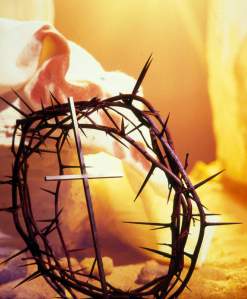 spiritual maturity was at an all time low in the land. Although Jesus healed the sick, helped the lame, and blessed the children, it didn't matter. It was if they just completely forgot the belovedness of their teacher-- and were caught up in the emotions of the moment. With ease, they said with their words, "Jesus, we want you gone!" It was the dark night of soul-- betrayal at a corporate level! It was a moment when the suffering for Jesus went to an even deeper level.
spiritual maturity was at an all time low in the land. Although Jesus healed the sick, helped the lame, and blessed the children, it didn't matter. It was if they just completely forgot the belovedness of their teacher-- and were caught up in the emotions of the moment. With ease, they said with their words, "Jesus, we want you gone!" It was the dark night of soul-- betrayal at a corporate level! It was a moment when the suffering for Jesus went to an even deeper level.
So, what was Jesus' promise in the night now?
If you've stuck with me throughout Lent, you begin thinking that in the face of the horridness of crucifixion to come, there possibly couldn't be a promise for Jesus at this juncture! We must have run out of promises by now!
But, such is not the case when we peer into our Old Testament lesson for this morning from the book of Isaiah. As the children of Israel continued to deal with the ongoing disappointments, frustrations and shouts of "How long O Lord?" are you going to make us wait in Babylon in exile, hope seemed lost. They basically were shouting "We want to go home!"
Verse 6 of Isaiah 50 serves as the center piece of the Israel narrative telling us from a personal perspective what it feels like to be in the midst of a time of deep loss and pain. And though the desire to give in, give up, or simple fall under pressure arises, Israel is asked to be strong. Israel is asked to actively wait. Israel is asked to stand and move through their sufferings through resistance that is not self-seeking, but resistance that sees the bigger picture.
Verse six says, with a collective voice for Israel speaking: "I have my back to those who struck me, and my cheeks to those who pulled out the beard; I did not hide my face from insult and spitting."
With some consideration in mind for the trials of the life of Israel at this time, it seems odd doesn't it that they'd be boasting of "turning the other cheek?" We might even call this weakness. But, courage comes it seems to remain in this posture, why? Because look with me at verse 7: "The LORD God helps me; therefore I have not been disgraced; therefore I have set my face like flint, and I know that I shall not be put to shame."
In a nutshell, Israel remains committed to enduring the injustice in an active way-- for the only way to faithfulness is to move their way through the suffering is to simply keep standing. Why? We hear the testimony of the Lord being with them.
If we go back to our gospel for this morning, we see this promise lived out in Jesus as he stays grounded in himself-- no matter who spoke ill against him. For there was no amount of shouting, no amount of mockery, no amount of physical pain would change him or set him off course of fulfilling his mission. With Jesus:
There would be no overt shows of power for power’s sake.
There would be no reigning down the heavenly lights to slay the captors which spoke ill of him.
There would be no dueling or "I'm better than you" contests between Jesus and his adversaries.
Jesus remained steadfast in suffering.
Do you really get this part of the story? I mean, I know I'm talking to several folks who have been in church their entire lives, but do you really get the point that Jesus could have done anything to save himself, to defend his honor to command his disciples to get their butts out of hiding and come protect him-- yet he doesn't?
If we were to sum up the actions of Jesus during this dark night of the soul, we'd have to say that he modeled for a God-fearing response to suffering as he clung to the promise of "Endurance to Stand."
No matter what. No matter why. No matter how long. Jesus stands. Jesus faces his sufferings head on.
When we think about our own experiences, it is true, like Jesus, we all know a thing or two about situations that are unfair.
Anyone experience a back-stabbing loss lately?
Anyone experience a life-threatening illness lately?
Anyone experience the lonely nights of grief lately? I see many faces nodding back at me in affirmation.
But, while true, as we were discussing in our Wednesday night grief class recently, few of us (if any) have faced suffering to the decree that it threatened to end our life as Jesus did in this reading of our scripture this morning. Few (if any) of us have been asked to make the choice of either our faith or our life again, as Jesus experienced. But, such has not be the case of all Christ followers throughout the centuries.
Consider the Civil Rights movement in our country over the last century and the suffering evoked for many as a result. It was a time in our history when making stands for racial equality in the name of one's faith, easily could have cost you your life.
Under the leadership of Dr. Martin Luther King, especially, hundreds, then thousands, then ten thousands, of folks took stands for freedom for all, putting their own lives in danger. But they did so not the way that their adversaries expected. No militia formed. No battle plan of warfare was drawn. No slogans of "We really hate you, oppressive white folks" were placed on protest posters. No, a revolutionary campaign of non-violent resistance began through boycotts, marches and speeches. But, not without some push back from community leaders who thought this approach of standing tall and not backing down to fear or to violence was pointless. Dr. King had some explaining to do. During the Montgomery Bus Boycott in 1957, Dr. King sought to give theological perspective to simply standing strong saying:
A nonviolent resister does not seek to humiliate or defeat the opponent but to win his friendship and understanding. This was always a cry that we had to set before people that our aim is not to defeat the white community, not to humiliate the white community, but to win the friendship of all of the persons who had perpetrated this system in the past.[i]
And, yes, as we know from history, there was suffering to the non-violent protests for civil rights. That while yes, friendships across racial lines were formed and while, human dignity was restored to many, it wasn't the whole story. Martin Luther King, Jr. and friends spent nights in jail. Dogs and fire hoses were directed toward school children. It led to the senseless death of four little girls in Sunday School class in Birmingham. And the list could go on. Suffering came. And it wasn't pretty. We know Dr. King eventually lost his life in the fight.
Teresa of Ávila, the sixteenth century mystical writer, knew of this wrestling with life-threatening suffering.
In a particularly difficult moment of her life she was forced to cross a river while sick with fever. She raised her voice of complaint heavenward, "Lord, amid so many ills this comes on top of all the rest!" A voiced responded, "This is how I treat my friends." "Ah, my God!" Teresa retorted, "That is why you have so few of them!"[ii]
In the same way, when we too continue to grow in our faith and walk in the footsteps of our Lord, I believe, much like Jesus, and like our forefathers and foremothers in the faith, we too will face suffering that it must to our distaste. Our suffering too will be longer. It will be more painful. It will cost us more than we ever could have imagined. It will force us to rooms filled with darkness that we'd rather overlook than deal with head on. But, as friends of God-- it doesn't matter, suffering is just a part of the human condition, even as Jesus lived it.
But, as followers of Jesus, as we suffer, is does not come without comfort. We are given the courage to actively say "no" to what is unjust even if pain still comes. We are not asked to lose our souls in the process. We are given endurance by our Lord to stand through it and to know that even if death comes, resurrection is on its way.
Look with me again at verse 8 of Isaiah 50. The prophet speaks of the shared communion in sufferings as he writes, "Who will contend with me? Let us stand up together. Who are my adversaries? Let them confront me. It is the Lord God who helps me."
Let us stand up together-- the Lord says!
When insults are thrown against us, we can say because of the Lord, "I'm going to stand!"
When gossip is hurled against us, we can say because of the Lord, "I'm going to stand!"
When our best friends reject us and leave us alone, we can say because of the Lord, "I'm going to stand!"
When our words of testimony at work about our faith cause others to mock us, we can say because of the Lord, "I am going to stand!"
Some may feel it is in the fine print of the Christian contract (all this business about suffering), but following Jesus is anything but safe, I must remind you! The prophecy of Isaiah puts a sharp question to its readers, "Will you identify yourself with the suffering One?"
Jesus stood and now today invites us to stand too.
Today, I ask you, will you follow this Jesus? Will you commit to stand with him even if the night is long? Will you commit this week in a practical to go with him to the cross-- all the way-- even if it means taking time off of work, leaving some home chores undone or even changing some travel plans so that you can attend our Maundy Thursday and Good Friday services coming up this week?
The blessedness of our promise for this morning is that as much as we are willing to stand with Jesus, Jesus is willing to also stand with us.
So, today, let us come to this table together and share of the meal that reminds us that we are not alone, we worship the one who says to us, no matter what trials find our way, that we are not without grace to keep going. Our suffering is not useless. For, we are standing together with our Lord. Therefore, no matter what may come, no matter what may go we have this promise in our night: Jesus says to us, "I'm giving you endurance to stand with me."
AMEN
[ii] Illustration found in Working Preacher: Sunday of Passion "Isaiah 50:4-9" Mark S. Gignilliat http://www.workingpreacher.org/preaching.aspx?lect_date=4/1/2012&tab=1
By Faith We Go On: Hebrews 12:1-2, 8-12
Martin Luther King, Jr. Christian Church 30th Anniversary Service & Joint Service with Washington Plaza Baptist Church
Now, I know that some in the congregation this morning, get to hear me talk more than they might like-- as I preach every Sunday-- but for the rest of you all gathered today, you probably don't know much about me other than the kind words that Pastor Jean shared with you earlier (thank you). So, there is something I really need to share with you about my past in order for you to get where I am coming from this morning.
As a child, on countless occasions, I desperately wanted to become my dog. Yes, my dog, named Trevor. Trevor, became a member of our family when I was in 4th grade so that my younger sister Emily would stop screaming bloody murder every time she was in a room with a dog. Though a moody and hyper pup, I loved Trevor from the start. And so, regularly, I asked my mom if he could ride along with us as she took me to school in the mornings.
One particular morning, fearing the worst day ever-- a spelling test I did not study enough for, meeting up with some potential bullies on the playground, and having to sit through an extra math class on long division-- I remember voicing to my mom just as I was about to get out of the car that I wished could become Trevor, if only for a day.
"Why?" she asked looking surprised at my request. "Why would you want to be Trevor?"
 "Well," I said, "Trevor has such a good life and he doesn't even know it. He eats. He sleeps. He plays outside and we love on him. Never does Trevor have to worry about fights with other dogs or teachers giving him bad grades or even what his friends will think of his lunch. I wish, Mom, that I could be Trevor right now! I wish; I wish!"
"Well," I said, "Trevor has such a good life and he doesn't even know it. He eats. He sleeps. He plays outside and we love on him. Never does Trevor have to worry about fights with other dogs or teachers giving him bad grades or even what his friends will think of his lunch. I wish, Mom, that I could be Trevor right now! I wish; I wish!"
Of course, you know how well my wish of transformation into a dog went over. I did not get to have a one day vocation of eating kibbles and bits and barking at cats. But while a silly wish, isn't it true that it would be a lot easier to be dog than a living, breathing, worrying, stressed out, commuting to work in traffic every day human being? (They don't call it a "dog's life" for nothing!)
So, I ask you: anyone come to church with any worries today? Anybody come to church with any heavy burdens? Anybody come to church today with cares weighing you down that you'd just like to disappear from right now and become your dog (or better yet your rich neighbor's dog) for the day?
Well, welcome to the human plight of the hard life we live in, most of the time.
Dr. Tony Campolo, champion of social justice and professor at Eastern College, PA, once shared a meditation on the difference between human beings and the rest of the members of our mammal family, saying: "Human beings, as any social scientist will tell you, are unique among all the creatures on the planet. We are the only ones who are capable of imagining the future; of looking ahead."[i]
In contrast to the carefree nature of a squirrel gathering acorns, or a horse eating hay, or a lion searching for dinner as their singular daily purpose-- we as human beings have the reasoning capacity to fear the future, plan, and to anticipate death. Unlike our furry friends, our days are easily--- just as we brought to mind a few minutes before-- filled with anxieties about what is not and what might be.
But, this is not the whole story, Dr. Campolo said. Because we do have the capacity to imagine the future and to be filled with forward directed reason-- we also have the capacity for faith. We have the ability, unlike any other creature, to see the world from a greater perspective and to join our lives into what God is already doing in the world.
Therefore, hear this: faith, as an emotion and a state of being IS a uniquely human gift. For even though we all know death (like taxes) is coming, we do not have to be trapped in fear of what we don't understand, what is not yet, and what might be generations from now. Faith helps us face our future-- even if we know not what it will be. In this hard, hard world with all its challenges and sufferings, it is faith that God has given each one of us as how to get through!
Furthermore, faith is what God gave you and you and you and me, so that we could be in relationship with the awesomeness that is the Creator of the universe. God's gift of faith is how we even have the chance of knowing the One who is the ultimate good.
In our Hebrews lesson for this morning, we hear a good sermon proclaimed to a discouraged people, a people who faced sufferings and a people who really wanted to give up on their spiritual lives. And in this sermon they are given words of hope. These hope filled words began with "by faith."
Look with me at verse one of Hebrews 11: "Now faith is the assurance of things hoped for, the conviction of things unseen."
By faith, we have the promise, of God's dwelling in what we simply cannot see or get our minds wrapped around with impossible odds of accomplishment. And, as we read on beginning at verse 8, this preacher reminds us of the story of Abraham-- a man who knew a thing or two about being asked to live in faith.
Notice with me some key points from the Hebrew preacher's retelling of Abraham's story.
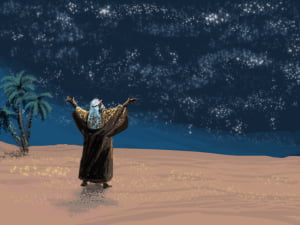 First, by faith, Abraham-- obeyed. When he knew that God had asked him to set his direction toward a particular task AND Abraham simply did what God wanted. Not what he wanted. And in obedience there was no whining. No complaining. No, "Well, God, maybe there could be another way"-- no, we read that Abraham obeyed.
First, by faith, Abraham-- obeyed. When he knew that God had asked him to set his direction toward a particular task AND Abraham simply did what God wanted. Not what he wanted. And in obedience there was no whining. No complaining. No, "Well, God, maybe there could be another way"-- no, we read that Abraham obeyed.
And, second, in this path of obedience, some unusual behavior was required-- to set out for a journey not knowing where he was going (stupidity by our modern standards of a GPS for everything, right?). But, on this unknown journey, Abraham had to be ready for whatever came, even if this meant going to a foreign land.
Not a land he knew anything about. Not a land that was comfortable for him. Not a land where he could drive by his old neighborhood every day and wave with a grin on his face of feeling secure. No, a land that was completely unknown-- with unknown people and unknown food and unknown smells and you name it: it was the unknown!
And, third, by faith, Abraham found himself without the security of permanence as he went on. Look with me in verse 9. Where does it say that Abraham lived? "in tents."
As much as Abraham hoped his journey with God would bring him fortune and wealth and a big plot of land to call his own with lots of little Abs running around-- God never gave him more than a home of a tent.
And more so, it wasn't even until the last act of his life, that God blessed him with a son, a miracle boy named Isaac. Isaac, a son that came by a promise that Abraham's descendants would be as many as the stars in the sky (but again made no logical sense). But, in all of this, by faith-- Abraham lived.
As I was reading over Martin Luther King, Jr. Christian Church's history this past week, I recognized quickly that this body of gathered believers, like Abraham knew a thing or two about the journey of "by faith."
For "by faith" in July of 1981 (I won't tell you how old I was on this day . . .), a small group of neighbors of parents of good citizens of this new community gathered and shared a crab dinner and began dreaming about being called a church together.
For "by faith" on January 15, 1982, a group of 12 committed Christ followers gathered in the home of Adelle and John Author Jones and selected a name for this new movement of the spirit and called it, Martin Luther King, Jr. Church.
For "by faith" on February 7, 1982 the group gathered again, this time at the Southgate community center to fellowship and celebrate their first worship experience together.
And, "by faith" the first interim minister, Rev. Dr. Joseph Dancy , Jr. was called to serve and lead this growing group of believers. And the word "Christian" was added to the church's name.
And, "by faith" later on Rev. Dr. Clinton D. McNair was called as pastor and lead the church alongside of you to begin to recognize that this new movement was not so new and so it needed a better "tent" to call home for the long run. "By faith" in 1987 2.3 acres of land was purchased through the sacrificial giving of so many of you at 11400 North Shore Drive in Reston.
And, the "by faith" story and it many twists and turns through the years could go on and on and I'm sure if I stopped my sermon right now and asked for testimonies, we'd be here until midnight recounting the good works, the impossible victories coming through and the lives in this community changed by the witness of this church. For, if there is anything I know about the story of Martin Luther King, Jr. Christian Church is story of "by faith."
You story has been one much like the Shel Sliverstein poem of not letting what others say about you determine you future when he wrote:
“Listen to the mustn'ts, child. Listen to the don'ts. Listen to the shouldn'ts, the impossibles, the won'ts. Listen to the never haves, then listen close to me... Anything can happen, child. Anything can be.”
You've, church, let God say to you throughout the years, "Anything can happen, child. Anything can be."
But is this enough? Should we pat ourselves on the backs and go home now?
As much as today is a celebration of the past, of the love of Christ that has been shared with the community through your hands and the hands that have gone before, today is also a crossroads of this "by faith" journey, for you, my Martin Luther King, Jr. Christian friends.
What will the title of the next chapter of your story be? In whom will you trust? And in whom will you follow? How will you choose as a church chose to move on?
And while there are countless perfect good ways that any of you could suggest for this fill in the blank statement: "We will move on by______" I suggest 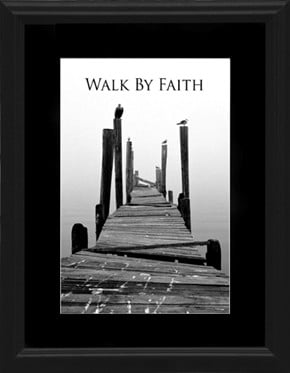 to you this morning, as one of your cheerleaders among many of us down the street there is only one way to move forward as a church and that is "by faith." Dr. King in fact once said: “Faith is taking the first step even when you can't see the whole staircase.”
to you this morning, as one of your cheerleaders among many of us down the street there is only one way to move forward as a church and that is "by faith." Dr. King in fact once said: “Faith is taking the first step even when you can't see the whole staircase.”
You know I told you that I read more about your history as a congregation before I prepared to preach today and I couldn't help as I read to pay close attention to the section of your history which highlights the tenure of my friend, Rev. Jean.
I have the utmost respect for your pastor and her leadership here. In fact, my Washington Plaza friends, it was she who gave me some of the best advice in the first couple months of my ministry in Reston when I was having one of those difficult days that come to any new pastor. She said to me, "It's going to get better. By God's help." And, "Yes, Rev. Jeanine, by God's help, we at Washington Plaza are having some good days together."
But, again, as I was reading, I noticed something unique about the focus of your current pastor, highlighted specifically about her time here and it was this sentence: "A focus area for Rev. Jean is the building of a diverse worship community that welcomes all races, creeds, and colors."
I dare say, we, the Washington Plaza Baptist community, would not be in these chairs today, if it wasn't for this faith conviction of your pastor. She's led you to claim the gospel, the whole gospel which means we've got to have people around us that don't look, think or even talk just like us to truly see the face of Christ.
And, in light of this, I can't help but think as I dream together today with you, my Martin Luther King, Jr. Christian friends that the next 30 years is going to look different from your first thirty years-- if you keep following by faith.
I might be wrong, but I can imagine that what you see today (look around the room right now) -- people of all races, creeds and colors worshipping the one God gathered here together-- is going to be a part of the what the future holds.
Sure, this congregation was founded on the need of doing church in a rich, worshipful tradition and passing down stories from one generation to another of a particular kind. But, 1982 is not 2012. And, what God needed from you, church in 1982 might not be what God needs from you faith believers of God in 2012 and beyond.
This is the reason why our movement must always be in faith. Because yes, while we know there is a future and we could very well be anxious about it (especially if we start comparing it to the past), we have a God who continually whispers in our ears the truth the Apostle Paul long ago taught us, "With God's power working in us, we can do more than we could ask for or imagine."
Because of this promise, I say dream church! Give church. I say grow church. Study church. I say give church. And in all of these things, live and move and have your being by faith.
After all, Dr. King once said: “If you can't fly then run, if you can't run then walk, if you can't walk then crawl, but whatever you do you have to keep moving forward.”
I'm excited to see where this by faith journey takes you and I even dare say takes us, as brothers and sisters in Christ, as friends, as partners in ministry together only blocks away from one another.
Can the church say Amen to our calling to "move on in faith?"
AMEN
[i] "Trusting in God in the Days that Lie Ahead" Program #4604 http://www.csec.org/csec/sermon/campolo_4604.htm
God Calls You: to See What Others Don't I Samuel 3:1-10; Romans 12:1-8
Several years ago while participating in the Lewis Fellows Young Clergy Leadership program, our group of 30 pastors gathered in Atlanta, Georgia for 3 days of workshops. One afternoon, our discussion sessions suspended and we were all encouraged to walk from our downtown hotel to the historic district of the city known as Martin Luther King, Jr.'s childhood home. Because we were studying leadership, it was important, we were told to get to know the culture and surroundings which shaped the greatest American civil rights leader of all times. Those of us who had not been to this site were eager for the opportunity to visit and absorb as much as we could.
As we began to walk around MLK's childhood home, it became apparent that one of the greatest influencers we learned upon Martin's life was his father. Though raised in separate but not equal segregated Atlanta schools-- his Martin Sr. was known to push his son to not become complacent in his studies or in his life.
One historian wrote: "Martin Luther King, Sr., quite often referred to simply as "Daddy King," served as the first role model for young Martin Luther King, Jr. and one of the principal influences in molding his personality. . . . He assisted in the organization of voter registration drives, participated in the NAACP, and sat on the board of Morehouse College. As pastor of the local church, he embedded strong religious ideals in his son and linked him to the church. The lectures from both King's parents on the subject of racial harmony stuck with Martin and armed him against all forms of prejudice."[i]
As the national park service guide concluded the tour, he summed up our experience in the home by saying, "If it wasn't for Martin, Sr. paving the way-- calling out academic and spiritual gifts in his son, we might not be standing here today talking about this man who did so much good for our country and the racial equality of all humankind."
Similarly, today, our lection for this morning dir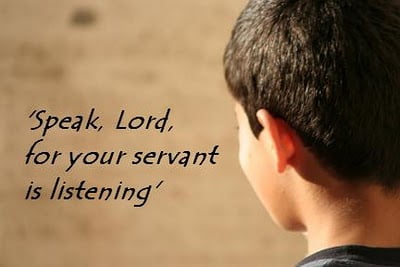 ects our attention to one of the greatest priest and prophets of all in time found in the Old Testament: Samuel, who would begin his life of service at a young age through an apprenticeship. Samuel, who would become a spiritual leader for turbulent times of transition in Israel's life together-- guiding and anointing the first two kings in the nation's history.
ects our attention to one of the greatest priest and prophets of all in time found in the Old Testament: Samuel, who would begin his life of service at a young age through an apprenticeship. Samuel, who would become a spiritual leader for turbulent times of transition in Israel's life together-- guiding and anointing the first two kings in the nation's history.
But, as we know, we don't just arrive in life without being under the influence of someone who teaches us. Who was the influence behind the spiritual upbringing of Samuel, like Martin Luther King Sr. was to his son? The answer arises in our lection for this morning.
In Samuel's childhood, Eli served God in the temple as the head priest. Though not his father, Eli had been in relationship with Samuel from his toddler years. Samuel's mother, Hannah, who struggled to conceive, prayed hard for Samuel's arrival. Eli was there to give Hannah a word of encouragement that God heard her prayers and one day she'd have a child. And, when Samuel was born and once weaned, Hannah dedicated Samuel to God in the temple for a life of service. Eli became his guardian.
Yet, while this story sounds beautiful from its beginning, it is important to note that all was not perfect. There were great problems in the land. Historically, since Moses and Joshua lead the nation of Israel to the Promise land, the people weren't very good at listening or paying attention to God's plans for their lives. The leadership system in place of judges did not receive wide-spread support from the people. The spiritual foundation in the land became increasingly far off-center of what God's presence in their lives looked like.
Furthermore, in a culture were religious leaders passed from generation to generation, Eli's biological sons were not up for the job. The son to son business of serving in the temple would stop with Eli. In fact, prophets had already showed up at Samuel's doorstep foretelling the consequences of the sons' corrupt behavior. Personally, I can imagine that Eli grieved the sadness of unmet expectations on part of his family-- they were not the family he wanted them to be.
So with all of this true, it didn't exactly seem like a moment in time when God would show up . . . when God would do something new... when God would bless.
Yet, if we know anything about our God we know that when we least expect is the very time that God does begin to move.
And, Eli emerges as the natural first choice. But, Eli, what? What was God thinking in picking him to begin this new movement in Israel's history that would begin with the call of Samuel.
This is what we know: Eli probably thought his moment in time of doing anything significant with his life had passed. It was his time to retire-- to kick back and enjoy life a little. And, physically, his health is failing. He's going blind in fact. Look with me at verse two where we are told about Eli, "whose eyesight had begun to grow dim so that he could not see."
Again, let me reiterate that seems completely unlikely that Eli would be the one to SEE anything significant. He couldn't see.
But, he does see. In the paradigm of how God works in the world-- using the most unlikely of us for the most unlikely of tasks, God calls out Eli to use his gift of prophecy or discernment to SEE things for Samuel.
In our New Testament lesson for today, we heard the words of Paul that we've stuck close to all weekend if you've been around for our chili cook-off and special Bible study sessions this morning. We've learned that we all have spiritual gifts. And these gifts are meant not for ou r own good, but to build up the Body of Christ. And, most of all, we've learned that using our spiritual gifts is how we move in and through our corners of the world with SIGHT bigger than just what we know. Offering our gifts to God is how we worship the Lord with our daily lives.
If our gift is service, we will see things that need to be done and do it-- we'll see when the kitchen needs to be cleaned, the paper products to be refilled in the bathroom, the food collected here to be taken over to the food bank. And, we will do.
If our gift is mercy, we will see the hearts of the hurting and broken-- offering a listening ear, a tissue, or simply being a presence.
If our gift is encouragement, we will see the bigger spiritual picture of individual and groups concerns-- offering a word of motivation, placing a meaningful book in a person's hands at just the right time, or offering to share a testimony in worship of where we see God at work in our lives.
If our gift is teaching, we will see the deeper truths in the texts of scripture and other literature that are meant to grow others in wisdom and knowledge-- enjoying the research process of preparing to teach as much as the teaching and watching the joy come to folks eyes when they get a new understanding.
If our gift is giving, we will see how our momentary resources can be used for the good if managed well-- being ok with less new things so that more funds can be directed to mission organizations, being ok with not getting credit for making donations, actually preferring it this way, and being blessed by seeing the fruits of their personal sacrifices bless the community at large.
If our gift is leadership, we will see the bigger picture of how to position just the right people in just the right places to bring transformative change in the administrative life of a community-- being the one who steps up and says a word, being the one who coaches others to claim their callings too, being the one who inspires vision in practical ways.
And, if our gift is prophecy, we will see the possibilities of what God can do that may not seem clear in the present moment-- using our voice to say yes to God's leading and helping others do the same.
And such was Eli's gift. When Samuel came to Eli twice in the middle of the night thinking that it was him who was calling his name, "Samuel, Samuel," Eli redirects him back to bed. By the third time Samuel hears a voice calling his name and still comes to Eli thinking that Eli was trying to tell him something, Eli sees the situation clearly. It was the Lord doing the calling. And because this was true, it was Eli's job to help Samuel recognize this and respond accordingly.
In verse 9, we hear Eli's prophetic word: "Therefore Eli said to Samuel, 'Go lie down; and if he calls you, you shall say, 'Speak Lord for your servant is listening."
Though it might be easy to be critical of Eli-- talking about his failings throughout his life and most certainly mentioning that he raised poorly behaved sons-- I believe that in this moment in time Eli fulfilled God's calling upon his life to see what others (aka Samuel) did not.
You see, with all the life-changing, spiritual game changing, Holy Spirit filled moments that Samuel would soon lead within the nation of Israel, it was Eli's six words that helped this boy who had not yet known the Lord to SEE the Lord for the first time. Using his discernment gift, Eli became the influential person who help Samuel think about the inconceivable plans that God had already prepared for his life.
It might be easy at this juncture of the sermon to think that calling to use your spiritual gifts is just for professional Christians or "those important" people (whoever those people are). But need I remind you that God places a calling to use our gifts on ALL of our lives. No one who desires to be used by God is left without a gift. No one.
Over a year ago now after a series of sermons, Sunday School lessons and discussions in Church Council, we agreed as a church to begin a deacon ministry again. And, so we asked for names from all of you of folks you thought had the gifts to do this job full of the gifts of mercy, service and encouragement. And, with my list given to me by the Congregation Care team of who your recommendations were, I began to make some calls to several of you.
While a few said "yes" eagerly right away, most of those I called were quite shy. "Who me? No, I can't be a deacon in this church?" (And you'd go to tell me the reasons why we shouldn't pick you).
But then after some time had passed, several of you came back to me and said, "Well if you believe in me and congregation see these gifts in me, I think I need to give it a try to serve."
And such an experience is not isolated to merely the deacon ministry. Countless times, I've seen the same situation played out in our community life together. Many of you have found yourself in positions of service, leadership or care that you never in a million years imagined you'd be. But, you're the ones signing up now to be being the liturgist, leading one of our ministry teams, helping out in children's Sunday School or serving in our hypothermia project because why? Someone used their gifts to encourage you to use yours.
This is the big picture my friends-- God wants God's body on earth to be blessed. God wants us to have every gift we need for the kingdom building that awaits us. And so God gave us each other. But, not just so we could bump shoulders and see someone sitting beside us in the pew. But, so that by using our calling-- seeing God through OUR particular lens of giftedness-- we help others see what they might never see if it weren't for us.
I dare say if Martin Luther King, Jr. was not taught serious study of the things of God from his father, we would not know his name today or have freedom in all the corners of our land where it exists today. If Eli hadn't told Samuel to go and respond to the Lord when God called, we wouldn't have known King David and all that he would teach us about praising God's name through song.
I dare say too that there are countless new stories ready to be written in our community if only we each use our gifts to help others see what they could not see without us recognizing it first.
In 2003, I attended a meeting of the Cooperative Baptist Fellowship in Charlotte, NC where seminary professor and social advocate, Tony Campolo spoke. It came time to give the offering for missions after the sermon. And, the gentleman guiding the program asked Tony to pray before the ushers came forward to receive the offering. Seemed like a very normal churchy thing to do.
However, to the shock of many, Tony refused to pray. "What?!?" we were all thinking in our seats. Instead he said something like this: "We don't need to pray for the offering tonight because this is what I know about God. God has already given each us in this room enough resources to meet our $15,000 offering tonight. All we need to do now is to give. So, I'll start by emptying my wallet with the cash in it and maybe some of you could do the same."
And, just like Tony said that night, we got our $15,000 plus mission offering plus some in that very room.
Rest assured I'm not asking you to empty your wallets this morning . . . . though I am sure the trustees wouldn't mind.
But, what I am saying, like Tony Campolo said about giving, is that in this church, just like other local communities of faith, God has given us every resource we need to do what we are called to accomplish. God has given us teachers. God has given us servers. God has given us encouragers. God has given us leaders. God has given us those who can show compassion. God has given us givers. God has given us prophets.
This question then just sits on our shoulders: are we going to all God to use our gifts so that others can be blessed through us? How are you going to make God known by seeing what others don't?
AMEN
[i] Gregg Blackely "Formative Influences on Dr. Martin Luther King, Jr." Peace Magazine. http://peacemagazine.org/archive/v17n2p21.htm